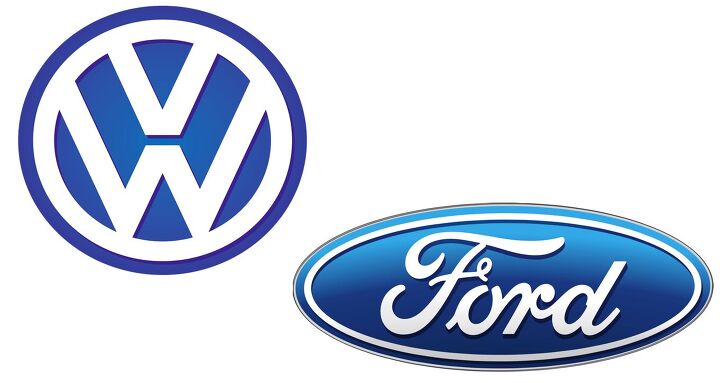Ford and Volkswagen Might Make NAIAS Their Big Coming-out Party

Ford and Volkswagen, two auto giants who spent much of 2018 making eyes at each other and playfully batting away rumors (and sparking a few of their own), might lay their relationship bare in Detroit next week.
The two automakers have already signed a Memorandum of Understanding, partnering initially with the aim of developing joint light commercial vehicles. But that was just the start. Over the course of the past year, this partnership grew to include pickup swaps, electric vehicle platform sharing, joint U.S. plants, and God knows what else — at least according to rumors. Both companies made it clear something big was brewing, but always fell back to a “we’re just talking” line.
Now, it looks like we have a time and place for the announcement.
According to two sources who spoke to Reuters, the two companies plan to reveal a deeper partnership early next week, with one of the sources calling it a “global alliance.”
While neither automaker has confirmed such an announcement, Automotive News notes a suspicious slot in the North American International Auto Show’s media days itinerary. On Tuesday at 8:30 a.m., the events schedule shows the Cobo Center’s main stage playing host to a “pending industry announcement.” Show organizers aren’t saying which automaker or automakers booked the slot.
If Reuters‘ sources are to be believed, Ford and GM will combine their efforts in numerous product areas — and markets — in a bid to stay current and cut costs. Talks are apparently “going well.”
It’s known that Ford’s planning a significant global workforce cull in the near future, but the automaker hasn’t gone into specifics about the the number of cuts. Meanwhile, Volkswagen remains saddled with expenses brought on by its diesel affair and its forthcoming electric vehicle push. A tie-up could prove lucrative to both.
“It is premature to share additional details at this time,” a Ford spokesperson told Reuters.
At this point, Ford and VW have done as much to spur suspicion of a looming announcement as any source. This past summer, the two stated that, in addition to the joint commercial vehicle plan, other joint projects were under consideration. In December, VW CEO Herbert Diess, appearing in Washington DC, said his company was in “quite advanced negotiations and dialogue” with Ford, adding that the results of their talks could be good for the American auto industry.
[Image: Ford, Volkswagen]

More by Steph Willems
Latest Car Reviews
Read moreLatest Product Reviews
Read moreRecent Comments
- EBFlex It will have exactly zero effect
- THX1136 What happened to the other companies that were going to build charging stations? Maybe I'm not remembering clearly OR maybe the money the government gave them hasn't been applied to building some at this point. Sincere question/no snark.
- VoGhost ChatGPT, Review the following article from Automotive News: and create an 800 word essay summarizing the content. Then re-write the essay from the perspective of an ExxonMobil public relations executive looking to encourage the use of petroleum. Ensure the essay has biases that reinforce the views of my audience of elderly white Trump-loving Americans with minimal education. Then write a headline for the essay that will anger this audience and encourage them to read the article and add their own thoughts in the comments. Then use the publish routine to publish the essay under “news blog” using Matt Posky listing the author to completely subvert the purpose of The Truth About Cars.
- VoGhost Your source is a Posky editorial? Yikes.
- Fed65767768 Nice find. Had one in the early-80s; loved it but rust got to it big time.Still can't wrap my head around $22.5K for this with 106,000 km and sundry issues.Reluctant (but easy) CP.


































Comments
Join the conversation
Ford gets access to Volkswagen's MQB, MLB, and MEB electrification architectures. Since they're so flexible, VW essentially sells them the kit and Ford can reskin them pretty dramatically such that nobody really knows what's under the hood. Saves Ford the investment in car platforms, especially electrification. Volkswagen gets greater economies of scale, and I wouldn't be surprised if VW takes over some of the Ford factories being shuddered for additional capacity that will be needed. VW also, potentially, gets access to some of Ford's SUV goodies. At the end of it, my gut tells me that VW has realized that the most cost effective way to extract more income from North America is to sell its car architectures to Ford. Sergio's comments about platform sharing a few years ago were more prescient than many were willing to give him credit.
Now I understand why Ford isn't making cars anymore.